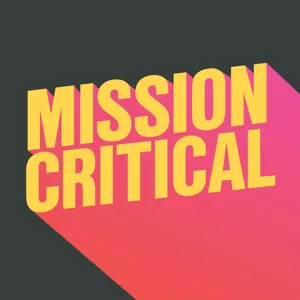Podcast Summary
Creating a Meaningful Connection with Customers: Successful businesses focus on more than just their product or service, they create a unique brand identity that resonates with consumers and builds meaningful connections.
Successful businesses often focus on more than just their product or service. They create a unique brand identity that resonates with consumers. Bert and John Jacobs, founders of the Life is Good brand, did just that. They started selling t-shirts with the phrase "life is good" printed on them and turned it into a $100 million business. The phrase became the brand, and it represented an attitude and way of seeing the world. Amica, a mutual insurance company, also emphasizes the human connection in their business. They prioritize empathy and work to make insurance feel less transactional and more personal. For business travelers, the Delta Sky Miles Platinum Business American Express Card offers a similar approach, making the travel experience feel more rewarding and enjoyable. Overall, these businesses understand that creating a meaningful connection with customers can lead to long-term success.
The founders' challenging childhood and father's accident inspired the 'Life is Good' brand: The 'Life is Good' brand was founded on the belief that one can find happiness and positivity in life despite adversity, inspired by the founders' own experiences of growing up in a struggling family and their father's accident.
The "Life is Good" brand, which is present on various items like t-shirts, socks, keychains, and more, gained popularity not just because of its catchy slogan, but also due to the personal experiences of its founders, Bert and John. They grew up in a financially struggling family with six children, where they faced daily chaos and financial strain. Their parents, who were very different from each other, had a near-death car accident that left their father unable to use his right arm, leading to frustration and depression. The family's economic struggles and the father's emotional turmoil created a chaotic environment that influenced Bert and John's perspective on life, shaping their belief that one can find goodness in even the most challenging circumstances. This personal experience became the foundation for the "Life is Good" brand, which encourages people to find happiness and positivity in their lives despite adversity.
Brothers' bond and shared experiences shape their future business: Growing up, Bert and John's strong bond, humor, and entrepreneurial spirits influenced their future business partnership
The shared experiences and close bond between two brothers, Bert and John, played a significant role in shaping their individual interests and eventual entrepreneurial venture. Growing up, they developed a strong bond, often using humor as a means of connection. While they pursued different paths in high school and college, they both harbored entrepreneurial spirits, with Bert starting businesses in seed selling and house painting, and John focusing on art and writing. Their cross-country road trip in the late 80s marked the beginning of their business discussions, inspired by their past successes selling t-shirts in college. These experiences and their strong bond set the foundation for their future business partnership.
Starting a t-shirt business from scratch: Determination and adaptability led founders to sell t-shirts in Boston, starting on streets, then dormitories, and gaining police recognition
Starting a t-shirt business from scratch involved a lot of hustle and creativity. The founders, Jacob and John, started by selling their designs on the streets of Boston but faced challenges with licensing and selling in high-traffic areas. They eventually found success by selling directly to college dormitories, which were plentiful in Boston. Their designs, such as the Irish t-shirt for St. Patrick's Day, were inspired by holidays and celebrations. They started with duffel bags but eventually set up a card table and eventually got enough sales to focus on dormitories. Despite the challenges, they persisted and eventually gained recognition from the police in Boston. Overall, their success came from their determination and ability to adapt to selling in various environments.
Adapting to sell during college evenings: Persisting through challenges, they grew a t-shirt business by adapting to sell during college evenings, using resourcefulness, and differentiating with a distinct brand.
The success of their t-shirt business during college depended on their ability to adapt and sell during the middle of the week in the evening hours. They learned that having a distinct brand or logo was essential to connect with customers and differentiate themselves from competitors. Their revenue was extremely low, and they had to be resourceful, often sleeping in their van and using college facilities for basic needs. Despite the challenges, they persisted, knowing that giving up on their dream meant considering real jobs and abandoning their entrepreneurial aspirations.
From bad ideas to a successful concept: Jake and John's partnership journey: Having a supportive partner and community can help entrepreneurs overcome doubts and challenges, leading to successful businesses based on simple, optimistic ideas.
Starting a business involves facing doubts and challenges, and having a partner to help laugh off the tough times and keep moving forward can make all the difference. Jake and John, the founders of the Life is Good brand, faced five and a half years of bad ideas before stumbling upon their successful concept. They attribute their perseverance to their partnership and the support they received from each other and their community. The idea for Life is Good came from a simple drawing of a happy character named Jake, which evolved into the belief that Jake was a superhero whose power was his optimism. The phrase "Life is Good" was open-ended and based in gratitude, and it resonated with people, changing the founders' lives forever.
The power of focusing on the good: Discovering the influence of optimism and focusing on the positive can lead to success, even during challenging times.
The power of optimism and focusing on the good things in life can resonate with people from all walks of life, even during challenging times. The founders of the "Life is Good" brand discovered this firsthand when they sold out of their T-shirts at a street fair in 1994, despite the prevailing grunge and cynicism of the time. This success was a testament to the influence of their mother, who taught them to focus on the positive and find joy in the simple things. Her optimistic outlook, even in the face of adversity, inspired the brand's philosophy and continues to resonate with people today. The founders' belief in the power of optimism and their authentic connection to the message allowed the brand to take off and become a success.
From $78 to a Multi-Million Dollar Business: The Power of Determination and Teamwork: Determination and teamwork can turn a small investment into a successful business. Use creativity, persistence, and technology to build relationships, create popular designs, and streamline workflows.
Determination and teamwork can turn a small amount of money into a successful business. John and Bert Jacobs, founders of the Life is Good clothing company, faced a make-or-break moment when they only had $78 left after printing their first batch of t-shirts. However, they didn't give up and instead used creativity and persistence to grow their business. They focused on building relationships with retailers and creating popular designs, such as the "life is good" t-shirt with an ice cream cone. With hard work and a little luck, they turned their small investment into a multi-million dollar company. Moreover, the use of technology, such as AI, can help businesses accelerate their growth and improve collaboration among teams. Atlassian, a software company, offers AI-powered tools like Jira and Confluence to help teams streamline their workflows and make informed decisions. Similarly, Masterclass provides access to expert-led classes to help individuals learn new skills and improve themselves. And Insparity, an HR provider, assists businesses in creating a positive company culture to attract and retain top talent. In conclusion, the stories of these successful companies demonstrate the importance of grit, determination, teamwork, and the use of technology in building and growing a business.
Identifying passions and building a business around it: Starting a successful business involves identifying what people love and building a product or service around it. Early success can lead to hiring employees and expanding operations, but challenges such as inventory management and trademark protection must be addressed.
The success of Jake and Nancy's t-shirt business came from identifying what people loved and building a business around it. They started with a bicycle ride and discovered roller-blading, then added a guitar, and asked people what they loved. Their first significant sale was a reorder, indicating potential growth. They operated from their apartment in Boston, but as business picked up, they hired their first employee, Kerry, and began thinking about distribution. To afford to pay Kerry, they needed to do $250,000 in business, which they surpassed. Despite the success, they faced challenges, such as storing and transporting their inventory, leading them to rent a container for their growing operations. They managed to secure the trademark for "Life is Good" despite its common usage, marking a significant milestone for their business. The summer of 1995-1996 saw non-stop growth, and they cracked the market with their innovative approach and unwavering commitment to their customers' desires.
The power of persistence and serendipity in securing a trademark for Life is Good: Persistence and chance encounters can lead to significant business opportunities. Despite multiple failed attempts, Life is Good founders secured a trademark with the help of a pro bono attorney they met at a basketball court.
Persistence and serendipity played crucial roles in the success story of the Life is Good brand. The founders, who couldn't afford an attorney, failed five times in their attempts to trademark their phrase. However, they met a trademark attorney, Bob Pierce, during a chance encounter at a basketball court. Pierce agreed to work pro bono, and with his guidance, they made the necessary changes to secure the trademark. This was a pivotal moment for the brand, as it allowed them to establish a strong legal foundation and protect their intellectual property. The founders, who divided their labor based on their strengths, were able to grow the business and attract larger retailers like Galians (later bought by Dick's Sporting Goods). Their ability to be transparent and authentic during their initial meeting with Galians led to a significant order and increased exposure outside of New England. The story of Life is Good illustrates the importance of staying persistent in the face of challenges, and the power of serendipitous encounters in achieving success.
Getting listed in Galleons led to major growth for the tea business: Being listed in a large retailer significantly increased sales and brought new opportunities for growth, but also required adaptation and investment.
Getting listed in a large retailer like Galleons was a game-changer for the small tea business. It led to a significant increase in sales, from 250,000 to over a million dollars, and brought new opportunities for growth. However, this success came with the need to adapt and invest in the business, such as getting a computer and hiring employees. Additionally, having a diverse distribution network proved beneficial during economic downturns. Despite the financial success, the founders were still living in their apartment and needed guidance from experienced business advisors to navigate the complexities of running a business.
The Power of Emotional Connections and Optimism in Business: The Life is Good founders prioritize emotional connections with customers and the positive impact of their brand over financial gain. They've learned the power of optimism from customers' stories and plan to continue spreading their message, focusing on expansion and creativity.
The founders of Life is Good have built a successful business selling T-shirts, but their primary motivation is not financial gain. Instead, they value the emotional connections they've made with customers and the positive impact their brand has had on people dealing with hardships. They've received thousands of letters and emails from customers sharing personal stories, which have taught them the power of optimism. They have no plans to sell or go public, instead focusing on expanding their reach and finding creative ways to continue spreading their message after they're gone. Despite their current success, they never forget their humble beginnings and remain grateful for the opportunity to live comfortably and travel. Their parents were proud of their business and supported them through difficult times.
Father's support fuels business success: Familial support and belief in unconventional ventures can lead to personal and professional growth for both parents and children
The encouragement and interest shown by their father in their business ventures, despite the unconventional nature and long hours, played a significant role in their success. This support helped alleviate pressure and fostered resilience during challenging times. Additionally, the success of the business may have contributed to their father's renewed sense of pride and happiness in his own life, creating a positive cycle for both him and his family. It's important to note that the brothers acknowledge the role of luck in their achievements, recognizing that they may have stumbled upon something bigger than themselves. Overall, the story highlights the importance of familial support and the interconnected nature of personal and professional growth.
Unexpected success through perseverance and creativity: Staying committed to your vision and being open to opportunities can lead to unexpected success. John and Bert Jacobs' Life is Good Company and Jim Malone's furniture business are prime examples.
Perseverance and creativity can lead to unexpected success. John and Bert Jacobs' Life is Good Company reached new heights when one of their shirts made it to space. Meanwhile, Jim Malone transformed a piece of old bowling lane into stunning furniture, but it wasn't until he received a big order from Starbucks that his business took off. Both stories illustrate the importance of staying committed to your vision and being open to opportunities. Additionally, the Acura ZDX and American Express Business Gold Card offer impressive features to help individuals and businesses excel in their respective fields.
From selling furniture at a flea market to a successful business: Adaptability and resourcefulness are crucial in overcoming unexpected challenges and growing a business.
Starting a business often involves facing unexpected challenges and adapting quickly to meet demand. Jim Krasner, the founder of Counter Ev Furniture, began by selling bowling alley furniture at a flea market. When he received large orders from restaurants in the DC area, he had to scale up production and hire more people to meet the demand. This required him to find a new source of wood, which he did by taking advantage of the closure of many bowling alleys across the country. Today, Counter Ev Furniture is a successful business with revenue in the low millions and a team of 16 employees. Jim's furniture can be found in numerous fast casual restaurants, including Shake Shack, where even former presidents Obama and Biden have eaten. The company's name, Counter Evolution, reflects the evolution of Jim's business from a small operation to a full-time furniture manufacturing company. This story illustrates the importance of being adaptable and resourceful in the face of unexpected challenges.





